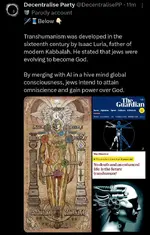Everything produced from the talmudic weltanschauung has themes of apotheosis and messianism in it. They can't help but channel their satanic energy that is hiding in their genes all the way from Cain until the present in everything they "create".
In comics specifically, you can literally see their imbuing of superpowers onto a false idol as an extension of their denial of Christ and the mortality of common man as God commanded.
-Superman (1938, Jerry Siegel & Joe Shuster)
-Batman (1939, Bob Kane & Bill Finger)
-Captain America (1941, Joe Simon & Jack Kirby)
-The Thing (Ben Grimm, 1961, Lee & Kirby, Fantastic Four)
-Spider-Man (1962, Stan Lee & Steve Ditko)
-The Incredible Hulk (1962, Stan Lee & Jack Kirby)
-Thor (1962, Stan Lee & Jack Kirby)
-Iron Man (1963, Stan Lee, Larry Lieber & Don Heck)
-The X-Men (1963, Stan Lee & Jack Kirby)
-Daredevil (1964, Stan Lee & Bill Everett)
-Doctor Strange (1963, Stan Lee & Steve Ditko)
-The Silver Surfer (1966, Stan Lee & Jack Kirby)
-Black Panther (1966, Stan Lee & Jack Kirby)
-Moon Knight (1975, Doug Moench & Don Perlin)
All created by jews, notice the same thing about all of them, then contrast them with those created by gentiles or Christians:
-Tarzan (1912, Edgar Rice Burroughs) – The noble savage raised by apes.
-Zorro (1919, Johnston McCulley) – A masked swashbuckler fighting corrupt officials.
-Dick Tracy (1931, Chester Gould) – A tough detective waging war on crime.
-Conan the Barbarian (1932, Robert E. Howard) – A fierce warrior in a brutal violent world. Howard also created the characters of Kull The Conqueror and Solomon Kane, a Puritan.
-Doc Savage (1933, Lester Dent & Henry Ralston) – The "Man of Bronze" an early super-scientist adventurer.
-The Shadow (1930, Walter B. Gibson) – The detective that jews stole the idea of to make Batman.
-Turok: Son of Stone (1954, Matthew H. Murphy & Rex Maxon) – Native American survivalist in an alien and dinosaur-filled world.
-Judge Dredd (1977, John Wagner & Carlos Ezquerra) – dystopian lawman who enforces totalitarian justice.
-Spawn (1992, Todd McFarlane) – dark antihero with supernatural Christian-based mythology fighting demons.








